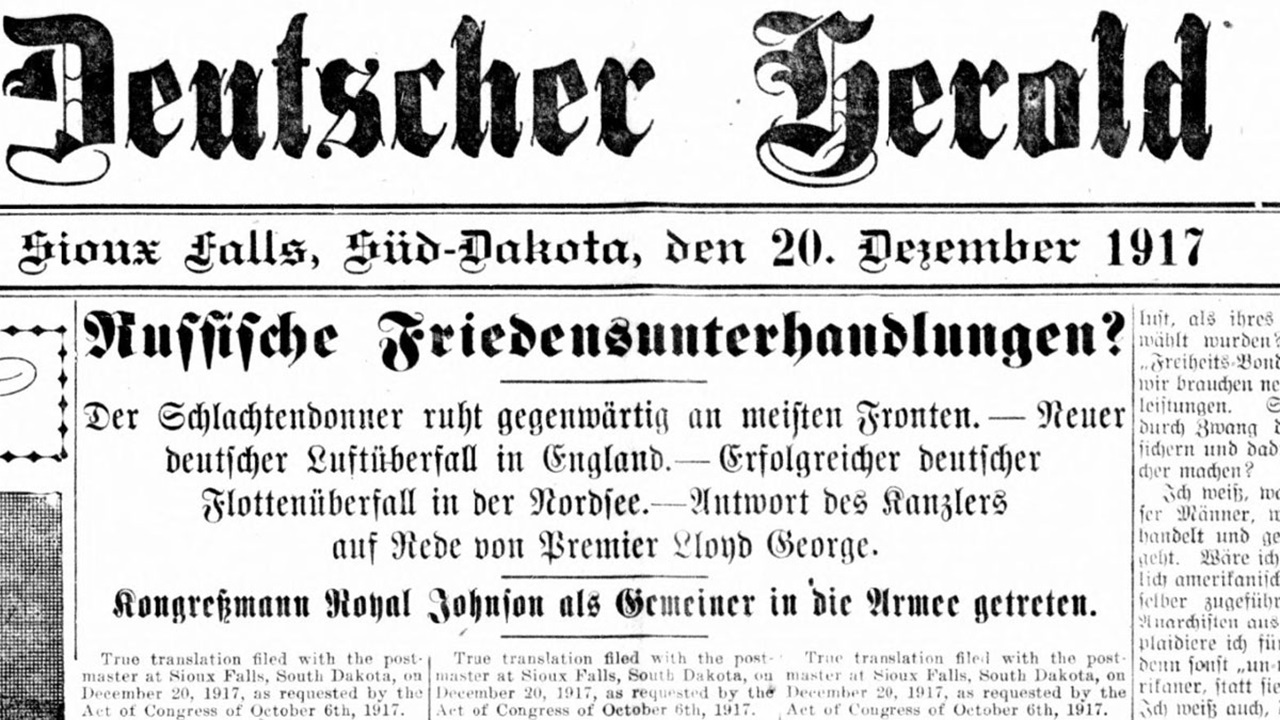Professor Emeritus Wins Award for Research on the Response to WWI-Era German Language Restrictions

Gombocz’s article, “‘A Menace to Peace and Progress’ Unexplored Newspaper Reports and Testimonials Pertaining to the Ban of the German Language in 1918,” won this year’s Herbert S. Schell Award for the best article in South Dakota History, the State Historical Society’s quarterly journal. The award is named for Herbert S. Schell, an historian and long-time USD professor.
While previous research had relied on English language sources in their study of the language bans, Gombocz’s work focuses on the response from German speakers.
“My contribution to this research concerns the reaction to these measures,” he said.
South Dakotan German speakers faced several discriminatory restrictions as the U.S. joined the fighting in Europe during WWI. In a 1918 decree with wide-ranging effect, the state’s Council of Defense ordered that no single academic subject could be taught in German at any educational level and banned the speaking of German in any public or semi-public meetings, including sermons or public worship. At the time, primarily German-speaking South Dakotans made up about 22% of the state’s population of nearly 584,000 residents.
In the state’s archives, Gombocz found letters and petitions from clergy expressing their alarm at the restrictions.
“Church in this country, and even more in Europe, is a very important way of preserving one’s identity,” he said. “Banning services in the target language jeopardized the long-term survival of those ethnic communities and it also discriminated against the elderly in those congregations who knew very little or no English at all.”
A few months after the first order, the Council of Defense passed an altered order removing the language about public worship but now prohibiting the use of the German language in assemblages of three or more people in public places and over the telephone.
Gombocz also pored over the dominant German language weeklies that existed during this time – Eureka Rundschau (McPherson County), Dakota Freie Presse (Aberdeen) and Deutscher Herold (Sioux Falls) – to document responses to the restrictions.
When the U.S. entered the war in 1917, the newspapers made declarations of unconditional support for the American government, even issuing bilingual oaths of allegiance. Once bans on teaching and speaking their language arose, the German language newspapers began criticizing these edicts.
German weeklies consistently stressed that prohibiting their language clashed with the tenets of American patriotism, Gombocz found. The Herold also reminded readers that the first German newspaper in the United States was founded by none other than “true blue” American Benjamin Franklin in 1792. That newspaper also quoted American poet Henry Wadsworth Longfellow’s “Song of Hiawatha” to support the cause of multilingualism.
During his research, Gombocz read hundreds of newspaper pages printed in elaborate Gothic script. The German-language professor said he was impressed by the sophisticated writing contained in the weeklies.
“The high level of grammar and syntax seen in the papers were read by members of the population that were not the most educated,” he said. “Hard-working farmers of the early twentieth century were able to read quite sophisticated German syntax. I’m really impressed by their patience and determination. These people must have been members of not only the first, but also the second generation of immigrants. They were still able and willing to read in the language of the home country.”
Gombocz’s article appeared in the Summer 2023 issue of South Dakota History. The South Dakota State Historical Society will honor him on Saturday, April 6, during the annual state history conference in Pierre.



